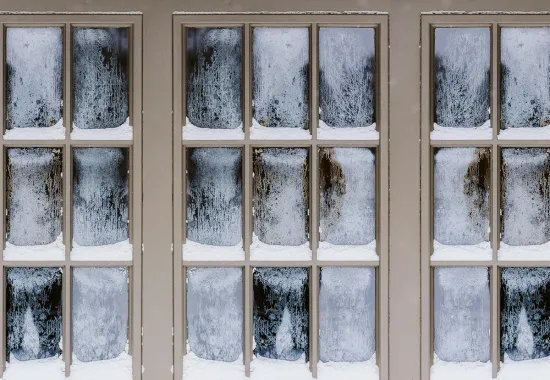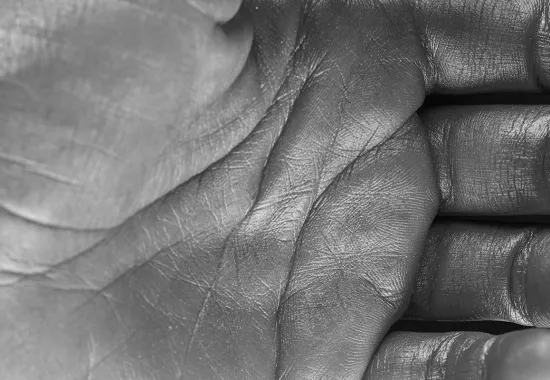The Farewell Foxtrot
Lonny craved coffee the way he used to crave just about everything else, and he would’ve had time to grab a cup from the fresh pot at the end of the bar if the battery in his tuner hadn’t died. Christ, he wanted to murder somebody. But he wasn’t about to ask for a bandmate’s tuner. Instead, he cocked his head and strained to hear his strings as he turned the pegs of his 1951 Gibson while the other players tuned their instruments, warmed their jaws, ran their scales, rattled rolls and paradiddles. As the noisy audience drifted into the dark jazz club, the musicians chatted about their previous nights and weekends, the girls they’d fooled around with, the scotch they’d drunk, how many years it’d been aged, whether they took it neat, or on the rocks, or with a dash of lukewarm water.
What a bunch of pricks his bandmates were, bragging about their merrymaking within his range. He could smell that coffee on the other side of the room. Just a taste would carry him through this fix. The club seemed stuffy and small tonight. The low lighting angling off the mirrors on the walls pulled awkward shadows down patrons’ faces as they dragged seats over the floor, unrolled napkins, and let the silverware tip to the table and chime against water glasses while the barback dumped ice from bucket to sink and the bartender shoved beer bottles into ice and arranged the shelves of liquor, clinking glass on glass. Lonny twisted the pegs but it was near impossible to hear his guitar.
It seemed everybody in the audience was on another level. A man in a bright banker’s suit pressed a palm to his nose, coked for the show. The dungy stench of pot wafted from a group of college boys giggling like nerds. A skinny fry sitting against the wall was nodding on and off, clearly doped up. Nobody knew the signs like Lonny did. He’d done it all. He couldn’t remember the last time he’d had a really good cup of coffee.
The show was about to kick off. Lonny tightened his high E string, then plucked the low E to measure their tones against each other and learned they were not in tune, though he couldn’t tell, over the noise, which one was sharp and which flat. In frustration, he raked all six strings, and the B string snapped. That pulled sweat through his skin.
Sweat dripped off his chin onto his guitar as the emcee introduced the band. His palms smeared sweat up and down the neck as the drummer counted. The show bopped ahead as Lonny threw on a new string and miraculously—thanks to Johnny, the sax player, who had an extra battery—managed to tune up in time for his first solo.
Then, just as Lonny’s phrasing started to get going into something not so bad, a giant bird flew into the club, sailed by him, and dropped a gob of shit onto the stage. Blue, yellow, and red, most certainly a parrot, it circled the room in a panic. Maybe Lonny was having an acid flashback. He continued to play through the commotion; in fact, the music became more energetic as each musician reacted to the bird’s frenzied flight. But just as Lonny’s improv hit the turnaround, the bird rammed into a mirror and dropped dead onto a Caesar salad. A blond chick with hair pulled tight into a fancy bun, a forkful of lettuce and crouton on the cusp of her lips, shrieked and sprung from her seat. So the bird was real.
Lonny’d been playing in jazz clubs around the world for decades, but this was unique. Still, it was a no-good night, the second set not much looser than the first, the coffeepot level steadily sinking in five-ounce increments as Lonny watched from the stage. On his knees after the gig, Lonny rushed to pack his guitar into its case and shove his music binder into his bag, then loped off the stage and strode toward the bar and the coffeepot. But when he lifted the pot, it was empty, clean and cold; the dark wall backgrounding the pot had tricked Lonny. Jeanine and the girls, he remembered, always had the kitchen and bar shut down minutes after last call.
Perhaps someone could brew another pot, but Lonny realized that wasn’t happening: Marco, the club’s manager, was busy squawking about the stench of the dead bird’s shit and the bumbling stooges at the local zoo. “They couldn’t lock a fuckin’ cage,” he complained over and over.
Meanwhile, Rocco the drummer had cracked open a bottle of Macallan’s twelve-year and was handing around plastic cups to the band. The fumes were mighty. Even after three years sober, Lonny’s wanting had a hint of withdrawal in it, an unrelenting buzz of deprivation. He hurried back to the stage to get his gear.
There was a twenty-four-hour diner right around the corner on 6th Ave. That’s where Lonny needed to be. But just as he slid on his frayed leather jacket, Richie, the band’s manager and trumpeter, hopped off the stage and got in front of him. With his low police siren voice issued from under his wannabe Magnum P.I. mustache—bushy but see-through—he started chiding Lonny about the amateur hour tuning flub, the broken string right before the set start, no backup axe on hand, his nervous tempo rushing the band all night, the general downward spiral that his playing, and his appearance too, had taken, which was—“now let me finish, Lonny, no, it’s absolutely true”—obvious to everyone in the band.
Then Richie stepped closer and squeezed Lonny’s shoulder. Richie was short and stocky, Lonny tall and lanky, so Richie’s scotch breath peppered Lonny’s Adam’s apple. “Lonny, man, I’m gonna try real hard and be honest with you. Maybe you were never handsome, but you had swagger.”
Lonny ran his hand through his gray hair and rolled his eyes.
“I don’t get it.” Richie’s shoulders lifted and fell. “I’m trying here, but you’re giving me nothing. What’s this bummy hangdog vibe? You almost reached legend status once. Me and the guys are wondering about your commitment to this band. What do you want?”
Ha, Lonny thought. Fuckin’ Richie, talkin’ about status. Here’s Richie’s status: he was a rickety Miles ripoff, sloppy and servile. He was a bad cover, only in the band because he was a good manager. Man, it wasn’t that long ago Lonny’d been one of the go-to session guys in the country. He could find another gig. Fuck these guys.
Richie stood there, his hyper eyes twitching side to side, actually waiting for an answer to a rhetorical question. Lonny would never win a fistfight against Richie. Lonny was no fighter. Yet he found himself wanting to punch that mustache.
“You guys hear about that third-world coffee bean strike?” Lonny and Richie turned to find Vickie standing in the shadows behind a center floor table. One hand rested on a hip and two fingers tapped her tight black skirt to some tune in her head, likely an overdone jazz standard performed by a female vocalist.
“Ho, ho, wella, wella, if it isn’t Vickie with an i e,” Richie said, turning his whole body to face her. He never turned just his head; he didn’t have much of a neck. “I felt the morning coming on, but now you’re here it feels like a muggy ‘Night in Tunisia.’”
Her nostrils moved as she dragged in air. She bit her inner cheek and lifted her chin.
Lonny had been sleeping with Vickie for nearly four years. He preferred to assume the arrangement was unofficial, hush-hush. She was a constant reminder of the gap between reality and the ambitions he’d once had long ago as a formidable cat on the fast rise. Back when he was hot stuff.
“Lay off her, Richie.”
Richie pointed both palms at Lonny and shrugged. “What?”
“You saved my life, sweetheart,” Lonny said, stepping toward her. “Get me outta here, please.”
It was late by the time Lonny and Vickie stepped out onto 3rd Street. Even though the great ball of fire hadn’t yet risen from its shuteye, there was something about the gray of the sidewalk and how the trash skimmed across the bluish-black of the street that hummed of a new day. Another goddamned day. And Lonny thought, Shit, let’s get some goddamned coffee already.
“You guys were hot tonight,” Vickie said as they walked.
“I don’t know what you were listening to.” Lonny hefted his guitar case and pulled his bag’s strap further up his shoulder. “I’m gonna murder someone if I don’t get a cuppa joe.”
“The coffee at the show was real thin,” Vickie said.
Lonny stopped. “You had coffee?”
Vickie didn’t answer. She took his bag from him and, laying the shoulder strap across her body, said, “You know what’s impressive about you, Lon? No matter how many years you stay clean, you’ll never pretend you’re not an addict.”
Vickie was an addict too, but the shackles she lugged weren’t as heavy as Lonny’s. She was a jazz vocalist who sang standards, usually threw in her three wholly unmemorable originals, and told wholly uninteresting stories between tunes. Always accompanied by a Japanese lesbian pianist named Miksuto who had a great sense of humor when she wasn’t trying to tell jokes, Vickie had a reputation for being a not-so-great singer. But that’s only because she’d had these two gigs a few years back—before she’d started AA and coaxed Lonny into joining her—where she’d had a cold, taken too much cold syrup, drank a bunch of cheap bourbon, and didn’t realize when she’d hit some bad notes. Lonny wasn’t there, but the word was that she’d been loony. The critics had never paid her so much attention.
Lonny was kind to her then. He cooked her dinner while she cried and blew her nose, brought her out to foreign films, even rented a car and took her upstate for apple picking when the foliage was most fiery, a million breathing colors, gluttonous. He should’ve been a painter. He’d never noticed such vibrancy before or since.
Vickie was skinny with disheveled light brown hair, a warm though lopsided smile, a lump on her chin she called a beauty mark, and pock marks on her cheeks. The pock marks did not appear in professional photos. When she sang and got lost in the groove, she clenched her eyes like she was in pain.
Lots of guys in the jazz scene ragged on her; women did too. Lonny liked her, but she was not elegant. She had a tacky way, was incapable of whispering, and never ever knew when she was embarrassing herself. So Lonny, if you asked him, did not really have a girlfriend. It was weak of him, and he knew it. Nearly a year ago, she’d more or less quit the jazz scene. She’d been working on herself, her sobriety, seemed more at peace. Some part of Lonny envied her. Around that time, she asked him to move into her place uptown, but he said he preferred Chinatown. When she said she’d move to his place, he said, “Nah, I like it how it is.”
They turned the corner to find that the twenty-four-hour diner was closed. Confused, Lonny stood in front of the dark window, guitar case in hand. A few other hopeful patrons walked away grumbling.
Lonny and Vickie continued up the avenue, passing another two places that should’ve been open before finding a diner four blocks up. And this place was bustling. “That stinkin’ joint,” he said, as they squeezed onto two counter stools. He raised an arm and hollered down the counter, “Coffee down ‘ere,” then continued to Vickie, “It’s the only place in town that does three sets a night, trying to wring the last drop out of us.”
“Yeah, I know,” Vickie said. “Sucks. The crowd pays for a full set and only gets forty-five, fifty minutes. How ‘bout that parrot?”
“The fuckin’ crowd?” Lonny glanced at her. “I’m talking about us. We play three sets and get paid the same we get for two. What a crock.”
“Oh,” she said, “well that’s true too. Of course, the sets are shorter. You do play about the same amount of time.”
“Where’s my coffee? That’s not the point. It’s another set, another audience, they’re collecting another fifty percent. I never get into my groove in that place. Just when I’m starting to get hot, they’re dimming the lights and kicking us off stage. A place like that, I don’t thrive, not like the young guys coming up, these bush electric trios, playing that ridiculous groove jazz like it’s actually jazz. Fuckin’ kids, watering everything down. It isn’t bebop, it’s teeny-bop.”
“Lonny,” Vickie said, a jitter in her voice. “You do realize I’d normally be sleeping right now, but I needed to talk to you. I got these bus tickets….”
“Coffee down ‘ere!” Lonny shouted, banging the counter. Customers kept streaming in, crowding the aisles, hollering for coffee, elbows and coats rubbing up against everyone. Lonny repositioned his guitar case so nobody would kick it. A percussion of dishes smashed to the floor at the back of the room. Bodies were popping up, chairs tipping.
A small waitress tapped nicotine-stained fingers on the counter. She came over to Lonny and spoke conspiratorially. “I’m sorry, sir, but we’re all out of coffee.”
“You’re kidding.”
“I wish. Did you hear about that strike in South America? And apparently Africa jacked up the prices.”
Lonny looked at her with a funny smile. He felt he no longer understood English.
Vickie laid her hand over Lonny’s. “Listen, you ever notice how the city just burns and burns? I’ve been thinking, you and me could go somewhere, escape….”
“C’mon, let’s go.” Lonny snatched his guitar case and tugged her elbow.
Hurrying up the avenue, Vickie hustling alongside, Lonny said, “It isn’t fair. What happened to appreciation for the traditionalists? What happened to telling a story, you know, some actual melody? Not this BS chop chop, bend bend, finger tap and repeat crap. Now I’ll be the first to tell you, I ain’t no Lightnin’ Hopkins. I ain’t no Speedhead Slim. And I don’t wanna be.” Some people ran past them up the sidewalk. Others were hurrying the other way. “That’s not what it’s supposed to be about. And these frickin’ half-hour sets. Whoever heard a’ them? You’d think there’d be some coffee stands out by now. There,” Lonny pointed across the avenue to a place on a side street. “Let’s try there.” They heard a car crash down the block to the east. A horn blared and a car alarm yodeled. Lonny thought he heard a trumpet. His guitar was getting heavier. But none of that mattered. The daylight dams opening, gray and blue trickled through the streets.
“Lonny, slow down, will ya’?” Vickie said, trying to keep up with his long strides as they crossed the wide avenue. “You’re all red and sweaty. How much longer you think you can keep this up?”
This diner, too, overflowed. People plugged the entrance, some trying to get in, others trying to get out. The crowd undulated, especially near the cash register and front window. A big man in a blue jacket slammed back against the window, knocking the glasses off some old guy’s face. The streets, normally flowing with working stiffs around this time, convulsed with the frenzy of Bird’s saxophone bebop—everything everywhere at once. Throngs surged past Lonny. A jacket zipper whipped his hand. A shin knocked his guitar case. Car horns and curses whirred down the avenue. The man in the blue jacket gained his feet, about to pounce onto the counter when another big man in a dirty white apron, presumably the cook, stepped from the kitchen through the swinging door holding a shotgun, and pumped it.
What Lonny wouldn’t give for just one taste, a single coffee bean to nibble on.
“Do you trust me, Lonny?” Vickie asked, squeezing his elbow. “Will you come with me?”
Patrons flocked for the door, but apparently not fast enough, because the cook fired a round into the ceiling anyway. The deluge surged. Two kids with screwed-up eyes who’d obviously been partying all night tripped over each other, and the panicked crowd stampeded them.
“Damn. We can’t get coffee here either,” Lonny said. He pulled Vickie back toward the avenue before the diner’s large window shattered out and washed over the sidewalk. People jumped the cement window casing and scattered.
One block north they found a corner bodega, but the frightened Indian was just pulling the door closed and locking it.
Lonny pressed his palm to the glass. “No,” he begged.
Vickie seized Lonny’s arm and turned him around. He heard that trumpet again and thought of the parrot. Five penguins toddled past. Ambulances, police cars, and fire engines blasting their sirens sped down the street. A crowd of people sprinted across, but a lady in a beige skirt suit got clipped.
“For God’s sake,” Vickie screamed over the din. “Can we talk for a second already?” She pushed Lonny back and his guitar case tapped the wall.
“Watch the guitar, baby.”
She slapped him a good one. It echoed. “Would you listen to me, Lonny? You can’t keep going like this. You don’t see it, but you’re killing yourself.”
Across the street, a car ran into a fire hydrant and water shot up. That trumpet again.
Lonny jiggled his face, stretched open his eyelids. “Sorry. I just need that cup of coffee, and I’m all ears.” Daylight was searing the streets now, the sun rising over brownstones and shooting off glass buildings.
“I got us bus tickets,” she screamed, pulling them from inside her shirt. “Look, A-train to Port Authority to upstate. You remember upstate, don’t you? We could do it, Lonny. We really could.”
“Watch out,” Lonny said, pulling Vickie aside before a garbage can crashed through the bodega’s front window and three men with empty travel coffee cups, one with a baseball bat, hurdled through.
Lonny pulled Vickie another half block into a little fenced-off square. “You think I’m washed up too?” he asked, his voice and hands quivering. “I’m a musician, you know that. How is it my fault if Richie and….”
“Not your musicianship, stupid. You. You think no one carries a weight as heavy as yours. Why do you never look in my eyes anymore?”
That trumpet again, louder, its note sustained and heating toward a boil. The sun poked his eyes, dug at his brain. He wiped his forehead in the crook of his elbow.
“What do you want from me?” Lonny asked
“Surrender. You know how to do that, Lonny. Admit that this city’s dogging you, that you’ve become a beat motherfucker. We can quit this place together. Don’t you want to live?”
He wiped the back of his hand across his brow. “But my career is in this city.” His guitar weighed a ton. “Did Richie put you up to this? Someone at AA?” Creases lined his forehead. “Why are you doing this?”
“Because, Lonny. I love you.”
The sidewalk blurred in the heat. There was nowhere to look but at her. The shimmering light brought out the sweet hazelnut in her eyes. They looked tired, heavy. Her mascara had run like sooty tears. He recalled that same sad but strong look from years ago when she’d found him on the floor of his apartment, furniture and guitars sold for drugs, blood hardened on the needle beside him, a trail of vomit from the side of his mouth, across his cheek, and curdled in his hair. He shook his head, peeled his eyes away. “I really need that coffee.”
She slapped him again, and his eyes were compelled back to hers. “Will you snap out of it for once in your pathetic life? The universe is talking to you. This is it right now, man. You gotta make a choice.”
Over her shoulder he saw a giraffe gallop by, its tail whipping its own ass.
“Why do you say I’m dying?” His forehead was tingling, hot and cold. “Am I?”
“Yes. We both are. Every single day I live in this city, I die two days.”
He looked over her shoulder again and grimaced.
“Why are you making that awful face?” She raised her hands in surrender. “Maybe I’m crazy.”
He pointed.
She turned around and saw the giraffe, now followed by a parade of two more giraffes, a brown bear, and three monkeys. And then behind the monkeys, an elephant bound into sight. Vickie stumbled backward, and her heel landed on Lonny’s foot. “Ow!” he screamed.
The elephant turned for them. It blared its trumpet call. And the tone struck Lonny as impossibly pure, fiery as the foliage upstate, warm as Vickie’s eyes. He remembered, she was the one who’d saved him in the first place.
For a sixteenth-beat rest, the elephant looked at Lonny with curious eyes. Lonny could feel the universe through those eyes considering how to judge him. Then the elephant trumpeted once again and rose up over him.
Lonny knew this tune. The melody hummed within him. He dropped his guitar, grabbed Vickie’s hand, and pulled her underground to catch the A-train. Downstairs, shadows pulsed in a vacuum of silence. The subway car sat idle, doors open. Holding Vickie’s hand rather than his guitar, Lonny felt light and unsteady. They stepped in and sat on a bench. There were another twenty or so well-behaved folks hoping the doors would close already and the train depart for Penn Station or Port Authority, so they could get the hell out of the city, or continue farther north to uptown or Harlem or the Bronx, anywhere but this cuckoo neighborhood. They looked at watches, tapped their feet, paced, and mumbled to themselves.
Lonny closed his eyes. Every shred of his insides slackened. He sensed a wave of euphoria rushing his way, a full body tingle, felt his eyes could stay shut forever. But his body reminded him it could never be so simple. His restless blood, his inescapable deprivation, clawed against him. It was a senseless child who would not die. He opened his eyes to the advertisement directly across the aisle: Soul Coffee—Keep it Coming.
His vision blurred and the tears ran the wrinkles in his cheeks to his mouth. He wanted to punch himself out, to disappear from consciousness, and was about to bang on his thigh when Vickie’s fingers wriggled their way into his fist and pulled it into her lap. Her other fingers took his wet cheeks and turned his face to her. Her glance, with lifted brow and lips dimpled at the ends, was egoless. It was for him completely, he could see that now. Rather, it was for them both. But, he told himself, he couldn’t carry more weight. His gaze lowered, but she shook his face and his eyes returned to hers. After a moment, his gaze lowered again, and this time she dug her fingernails in. He tried to pull away, but she held fast, held his eyes on hers until the discomfort peaked with a rush and passed.
“Okay,” he whispered, as a fresh wave of warm tears ran the channels of his face.
“Okay,” Vickie agreed.
Lonny surrendered his face into her collar. The doors slid shut, and the train started to move.
Recommended
The Wild Women of Brigantine
The Salamander
Herring






